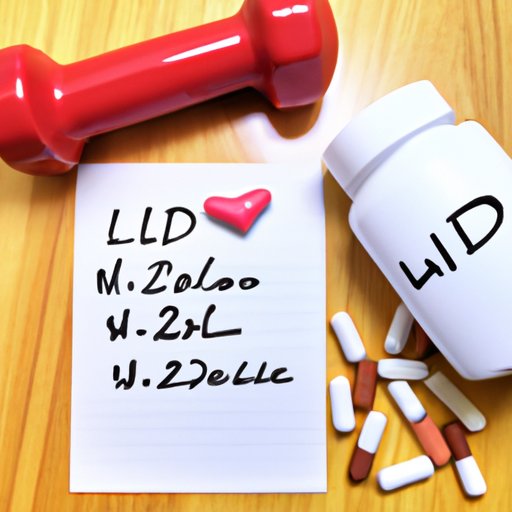How to Increase HDL: The Ultimate Guide
High-density lipoprotein (HDL) is commonly referred to as the “good” cholesterol. It plays a vital role in keeping the heart healthy by removing excess low-density lipoprotein (LDL) or “bad” cholesterol from the bloodstream. Unfortunately, high levels of LDL can lead to the buildup of plaque in the arteries, a condition that increases the risk of heart disease and stroke. Therefore, it is important to maintain a healthy level of HDL. In this article, we will explore seven proven ways to increase HDL and boost your heart health.
I. Incorporate Heart-Healthy Foods into Your Diet
Incorporating heart-healthy foods into your diet is an easy and effective way to increase HDL. Foods such as fish, nuts, avocados, olive oil, fruits, and vegetables are all excellent sources of heart-healthy nutrients that have been shown to increase HDL levels.
Fish, especially cold-water fish such as salmon and mackerel, are rich in omega-3 fatty acids, which have been shown to increase HDL levels. Nuts, especially almonds and walnuts, are high in monounsaturated and polyunsaturated fats, which can help raise HDL levels. Avocados and olive oil are both excellent sources of healthy fats that have been shown to improve cholesterol profiles. Eating a diet rich in fruits and vegetables can also help increase HDL levels by providing antioxidants, vitamins, and minerals that support cardiovascular health.
There are many ways to incorporate these healthy foods into your daily meals. For example, start your day with a bowl of oatmeal topped with nuts and berries. Snack on a handful of almonds or a piece of fruit instead of reaching for a bag of chips. Replace butter with avocado spread on your toast. And cook with olive oil instead of vegetable oil.
II. Start Exercising Regularly
Exercise is another effective way to increase HDL. Studies have shown that regular moderate-intensity aerobic exercise can raise HDL levels by up to 10%. Cardiovascular exercises such as running, cycling, and swimming are all good options.
It is important to start slowly and gradually increase the intensity and duration of your workouts. Aim for at least 30 minutes of moderate-intensity exercise most days of the week. You can break up your workouts into shorter sessions throughout the day if that works better for your schedule.
Consistency is key when it comes to exercise. Find an activity that you enjoy and make it a part of your daily routine. Consider finding an exercise buddy or joining a fitness class to stay motivated.
III. Quit Smoking
If you are a smoker, quitting is one of the best things you can do for your heart health. Smoking has been shown to lower HDL levels while also increasing LDL levels and damaging the lining of the arteries.
Quitting smoking can be challenging, but it is possible. There are many resources available to help you quit, including nicotine replacement therapy, medications, and support groups. Talk to your doctor to discuss which approach may be best for you.
IV. Reduce Your Alcohol Intake
While moderate alcohol consumption has been associated with a slight increase in HDL levels, excessive alcohol intake can have the opposite effect. Therefore, it is important to limit your alcohol intake to a moderate level.
The recommended amount of alcohol intake for men is no more than two drinks per day, and for women, it is no more than one drink per day. Keep in mind that a standard drink is equivalent to a 12-ounce beer, a 5-ounce glass of wine, or a 1.5-ounce shot of distilled spirits.
If you find it difficult to stay within these limits, consider limiting your alcohol intake by switching to non-alcoholic alternatives or avoiding social situations where alcohol is the main focus.
V. Take Supplements
There are several supplements that have been shown to increase HDL levels. These include niacin, fish oil, and plant sterols and stanols.
Niacin, or vitamin B3, is a water-soluble vitamin that has been shown to increase HDL levels by up to 30%. However, it can cause side effects such as flushing, itching, and upset stomach, so it is important to speak with your doctor before taking niacin.
Fish oil supplements are another option for increasing HDL levels. Fish oil is high in omega-3 fatty acids, which have been shown to have numerous health benefits, including increasing HDL levels.
Plant sterols and stanols are compounds found in plants that have been shown to interfere with the absorption of cholesterol in the intestine. They are often added to margarine, orange juice, and other foods to help reduce cholesterol levels.
Before taking any supplements, it is important to speak with your doctor to make sure they are safe for you and to determine the appropriate dosage.
VI. Maintain a Healthy Weight
The relationship between weight and HDL levels is complex. While being overweight or obese can lower HDL levels, weight loss can also lower HDL levels. Therefore, it is important to achieve and maintain a healthy weight through a combination of diet and exercise.
Eating a healthy, balanced diet that is low in saturated and trans fats and high in fruits, vegetables, and whole grains can help you lose weight and improve your cholesterol profile. Adding exercise to your routine can also help you lose weight and improve your cardiovascular health. Aim for at least 150 minutes of moderate-intensity exercise per week.
VII. Conclusion
In conclusion, there are several proven ways to increase HDL levels and boost your heart health. Incorporating heart-healthy foods into your diet, exercising regularly, quitting smoking, limiting alcohol intake, taking supplements, and maintaining a healthy weight can all help improve your cholesterol profile and lower your risk of heart disease and stroke. Talk to your doctor to determine which approach is best for you. Make healthy choices today and start seeing the benefits for your heart tomorrow.
